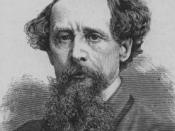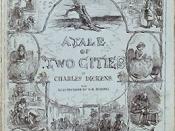Useful for ideas, though you may want to rewrite some things and fix it to the A level A creative and well written essay. Use more examples from the book.
There are many examples in the book A Tale of Two Cities of mistakes made by the legal system. The legal system has the capability to punish innocent men, and to set free or even reward a guilty one. Though it usually makes a just decision, the legal system can sometimes err.
Throughout the novel A Tale of Two Cities by Charles Dickens, Charles Darnay, a character in the book, was put to trial many times. He was put to trial in France because of his noble ancestry, over which he had no control. Because he had left France to get away from his family's past he was persecuted and prosecuted when he tried to return to help one of his family's loyal and innocent servants, Gabelle.
Though he had not committed any real crime, he was sentenced to death because he had left France. This is an example of the court's capability to punish innocent men.
The legal system is made to protect the innocent and to punish the guilty, but during the French revolution it was difficult to make a distinction between the two. The general population, described in the book as 'blue flies' wanted to see the nobles against whom they had struggled for so long, die. They were hungry for carnage, and the courts were happy to oblige. Charles Darnay was sentenced to death not because he had left France, or committed treason by betraying it in any way, but because his family was so despised by the public. He had done no real wrong, but because of the crimes of his father and uncle...



Hi James
Don't worry. It wasn't that bad:):):):):):)just a little short for a college student. But as I said "Don't Worry" coz' we'll fix it:)
P.S. HAPPY HOLIDAYS!!
4 out of 4 people found this comment useful.